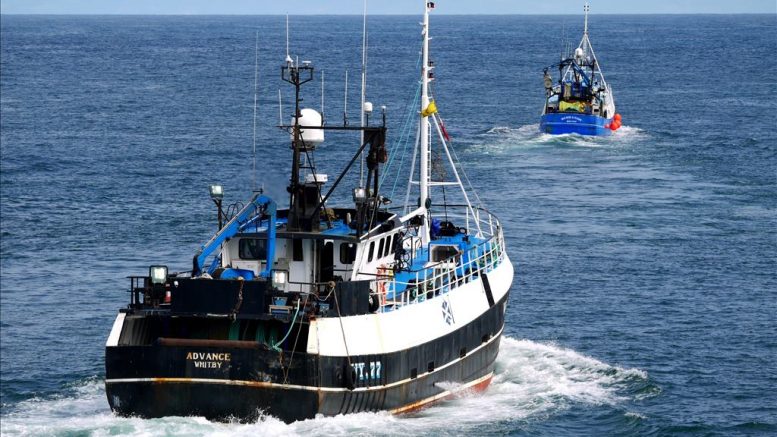Amid the Brexit doom and gloom one industry finds joy. But are the United Kingdom’s fishermen right to celebrate escaping the European Union’s common fisheries policy?
Some of Britain’s fishing fleet skippers have a dream. They see Brexit, especially a hard Brexit, as their return to the good old days. The days when they could fish where they wished and catch as much as they wanted without pesky Eurocrats stopping their fun. Those were the days before Edward Heath took Britain into the common market which led eventually to the EU’s hated common fisheries policy (CFP) with its control over catches and quotas.
Fishermen are said overwhelmingly to detest the CFP which they blame for cutting the UK fishing fleet by more than half since the late 1970s. They resent rules by Brussels that allow EU fishing fleets into previously exclusive UK fishing grounds. They have never quite forgiven Heath for putting North Sea oil ahead of fisheries as a national strategic interest.
This is especially true in Scotland which is home to almost two-thirds of the UK fishing catch. Fishing might be a small industry for the UK, but for Scotland it still matters. Any tourist driving through Scotland is familiar with the common sight of huge refrigerated trucks laden with fish, trundling south to the channel and on to customers in France, Belgium, Spain and Portugal.
If Britain blocks foreign competition, will the excluded nations still be happy to buy our fish?
Now there is excited talk of a return to the good old days of a 200 nautical mile limit, kicking out EU boats and a bonanza of landings to make what’s left of the fleet rich again. After all, if there is a hard Brexit, which seems quite possible, there would be nothing to stop Britain “taking back control” of an industry to allow skippers to sail back to happiness.
In the view of Bertie Armstrong, chief executive of the Scottish Fishermen’s Federation, Brexit is “fantastic news” for the British industry that could again be a world leader in sustainable seafood.
But it might not be that simple. Strong words of warning came last week from Struan Stevenson, the former Conservative MEP who presided over the European Parliament’s influential fisheries committee. Stevenson was always seen as being on the side of the fishermen and not the Eurocrats and he is listened to with respect.
He did not dispute the decline of the Scottish fleet or the loss of half the fisheries workforce since the 1970s when Brussels imposed new rules. But he talked of the “unpalatable truth” whereby the Scots were scooping 300,000 tonnes of cod a year at that time and could “indulge in this Olympic fishery with impunity”. Landings on this scale, he argued, were wholly unsustainable.
In less diplomatic language this was blatant greed. The fleet was killing off the industry on which it depended and it was the EU that saved the fishermen from themselves.
This is not a popular view, especially in north-east Scotland where the Scottish National Party (SNP) has spent a generation supporting fisherfolk and, in return, has gained much electorally. Last week, there were reports that in Banff and Buchan, with its long history of fishing, the people opted for Brexit which, if true, could make life uncomfortable for the Nationalists. Supporting the fishing fleet is almost a rule for every major political party in Scotland – the same parties opposed to Brexit.
Stevenson’s argument, supported by hard evidence of recovering stocks and improved sustainability, is that the EU deserves some credit for saving stocks. While some regulations and restrictions were clumsy and overly bureaucratic, the big picture showed Brussels had been a force for good and, as things stand, the future is bright for the industry. This is an argument most fishermen simply don’t want to hear.
And what if they now get their way and win back open access to the seas with much reduced competition?
Well, much more than half of the total catch in UK waters goes currently into foreign boats. Stevenson has warned: “Our fishermen are rubbing their hands together in gleeful expectation of chasing away all the foreigners and landing all of this catch ourselves. But we have to find a market for these fish”.
If Britain blocks foreign competition, will the excluded nations still be happy to buy our fish? Stevenson considers they might instead impose stringent tariffs to protect their own fleets. “The prevailing sense of euphoria in the industry needs a reality check – the CFP certainly had its flaws but without it there may have been no fishing industry left today,” he insists.
As with so much of Brexit, the future for British fisheries is far from clear.
●●● JUST PUBLISHED, November 30 ●●●
A parliamentary briefing paper UK Sea Fisheries Statistics examines trends in the UK sea fishing industry, including landings, employment, fleet size, trade, and comparisons with other EU countries.
A Backbench Business Committee debate pack on the Future of the UK Fishing Industry has been published. The debate is scheduled for Thursday December 1. It takes place ahead of the EU Agriculture and Fisheries Council meeting, where decisions over quota allocations for 2017 to Member States will be taken.
By Murray Ritchie





